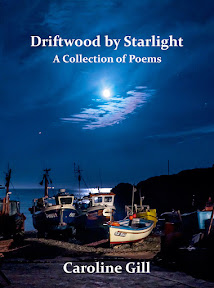
Cadgwith / Cornish: Porthkaswydh)
near The Lizard in Cornwall / Kernow
(click here to see artist Iain Dilley's watercolour painting from my photograph.
You will need to scroll down a bit once you have clicked the link until you see 'Cadgwith Fleet')
I am grateful to many who have been a positive influence in my journey which spans nearly half a century, and my chosen poem for today links me in my mind to a number of them.
Members of my family decided to evacuate to Cornwall during World War II, and enjoyed life in the county so much that they settled there permanently. Consequently some of my earliest holidays were spent near Bude on the north Cornish coast. However, as time went on - and largely thanks to the aforementioned poem - we fell in love with The Lizard peninsula, and with the small lobster fishing village of Cadgwith in particular.
I can now look back on numerous happy holidays; but before I mention a few specific memories, I must turn to the poem. Its title is simply Cadgwith, and you can read the eight line text by Lionel Pigot Johnson (1867-1902) here by scrolling down to number 46. You will also find the poem (number 691 on p.896 of my edition) in The Oxford Book of Victorian Verse.
During our Cornish holidays, we would look out through the sash windows on to a fuchsia hedge and a palm bush. My eye would then travel across a potato field to Cadgwith Cove. I remember standing at the landing window, aged about eleven, with an 'I-spy' book in hand, trying to identify the ships that sailed past.
Occasionally we would clamber into the car and drive down to Cadgwith to watch the full moon rippling across the water at midnight. We would look up at the stars beyond the huer's hut (top left in the photo), and think of Johnson's inspiring words. Forty-five years have passed since my first sighting of this remarkable place, but it has captured a corner of my heart. I have made many return visits and will never tire of this small haven of beauty.
Johnson is a self-effacing figure in today's poetry scene. He was well read, and enjoyed the literary company of Plato, Virgil, Augustine and Shakespeare. There is a memorial to him in the cloisters at Winchester College, his old school. Johnson published three books - two books of poetry and 'The Art of Thomas Hardy', another poet with Cornish associations. Johnson also wrote reviews, critical papers and a memoir.
I was browsing in a secondhand bookshop (a favourite holiday pastime) in Dunster near Minehead on one occasion when I came across a copy of 'A Cornish Chorus: a Collection of Prose and Verse' edited by Muriel Hawkey. I flicked through the pages and was delighted to find the title 'Cadgwith' under the Contents entry for Lionel Johnson. I turned to the appropriate page, only to discover that it referred to a second poem named after the fishing cove. I prefer the one mentioned first, but this second poem is not without its merits. This second poem concerns a 'rich autumnal day' rather than an 'autumn night'. It considers the role of humanity on earth and out at sea, in contrast to the first poem which moves between earth and heaven.

Our summer holidays around Cadgwith were filled with happy experiences and activities. I will restrict myself here, and attempt to list ten of these, 'in no particular order':
- times of fun, refreshment and relaxation with family and friends.
- the sound and wonder of the sea and the exhilaration of surfing.
- the beauty of the local churches. Grade Church is up the cliff from Cadgwith in the middle of a field, with fine brasses and no electricity.
- the joy of the wild flowers. Cornish Heath is very rare and grows on Goonhilly Downs at the northern end of The Lizard.
- the excitement each time we saw a Great Green Bush Cricket.
- the thrill of seeing a seal (we also saw a huge leather-backed turtle on one occasion).
- the colours in the serpentine rocks, especially when the pebbles were in rock pools.
- the fascinating names of the Cornish saints e.g. St Keverne, St Ruan.
- the local festivities e.g. Cadgwith Regatta, with its flour and soot race (perhaps not so ecologically friendly these days, but it was a lot of fun).
- the local delicacies - pasties, lemon sole, Saffron buns, Cornish splits (light bread rolls) and Cornish ice cream.







12 comments:
Thank you Caroline, I enjoyed this, and a hint of Cornwall's light has flashed far north!
What a beautiful spot in the world. I can see why it's your inspiration. Lovely post.
My mother always loved to see the stars at night and listen to the sea. I loved the eight line poem and the painting. I visited Brighton once but never made it down the coast to Cornwall. I love Rosamunde
Pilcher 's books. I like the way her descriptions, as in The Shell Seekers painted pictures in my mind of beautiful Cornwall. My sister-in-law visits there all the time. Your post reflects your joyous childhood days. I'm happy I visited today.
Wonderful verse and a wonderful post. The memories you describe sound inspiring indeed!
hello caroline, what a beautiful post!! the photographs throughout your blog are stunning - i especially love the pictures of puffins, i can't explain why but i have always loved puffins. your story of inspiration is so well-written and filled with the sort of magic i recall from my childhood. thanks. steven
I love Cornwall, I lived there for three months and before that had had several holidays in various parts of Cornwall
Hi Caroline,
Thanks so much for popping by.
We are going to stay in a village just outside Bude at the end of this month for our holiday!
I hope too, to be inspired by the landscapes.
I will be taking my sketch book and fingers crossed we will not have rain.
Michala x
such a nice post. and i love the poem.
i'm just back from amazon.com...side-tracked by the book suggestions in your sidebar.
happy to meet you!
Inspiring inspiration, Caroline! I love the poem too, and feel it's depth of meaning and atmosphere.
Hullo Caroline,
thank you for visiting my blog which then led me to yours and your lovely description of a beautiful part of Britain. We visited Dunstable in 1990 and just loved it. Don't remember your fishing village, but we saw many other parts of Cornwall which we really enjoyed. Cheers,
Robin
Cornwall sounds like a great place. Your childhood is filled with some great memories. I can only imagine the excitement of seeing a seal in it's habitat and that leatherback turtle. Wow. Thanks for sharing that poem by Johnson too. It was really good. Have a great day.
Cadgwith is lovely and it's sights seem familar. We have scenes like these in abundance in Maine. I imagine the fisher folk there are much like us, too. Thanks for sharing this and the wonderful poem from Johnson, too.
Post a Comment